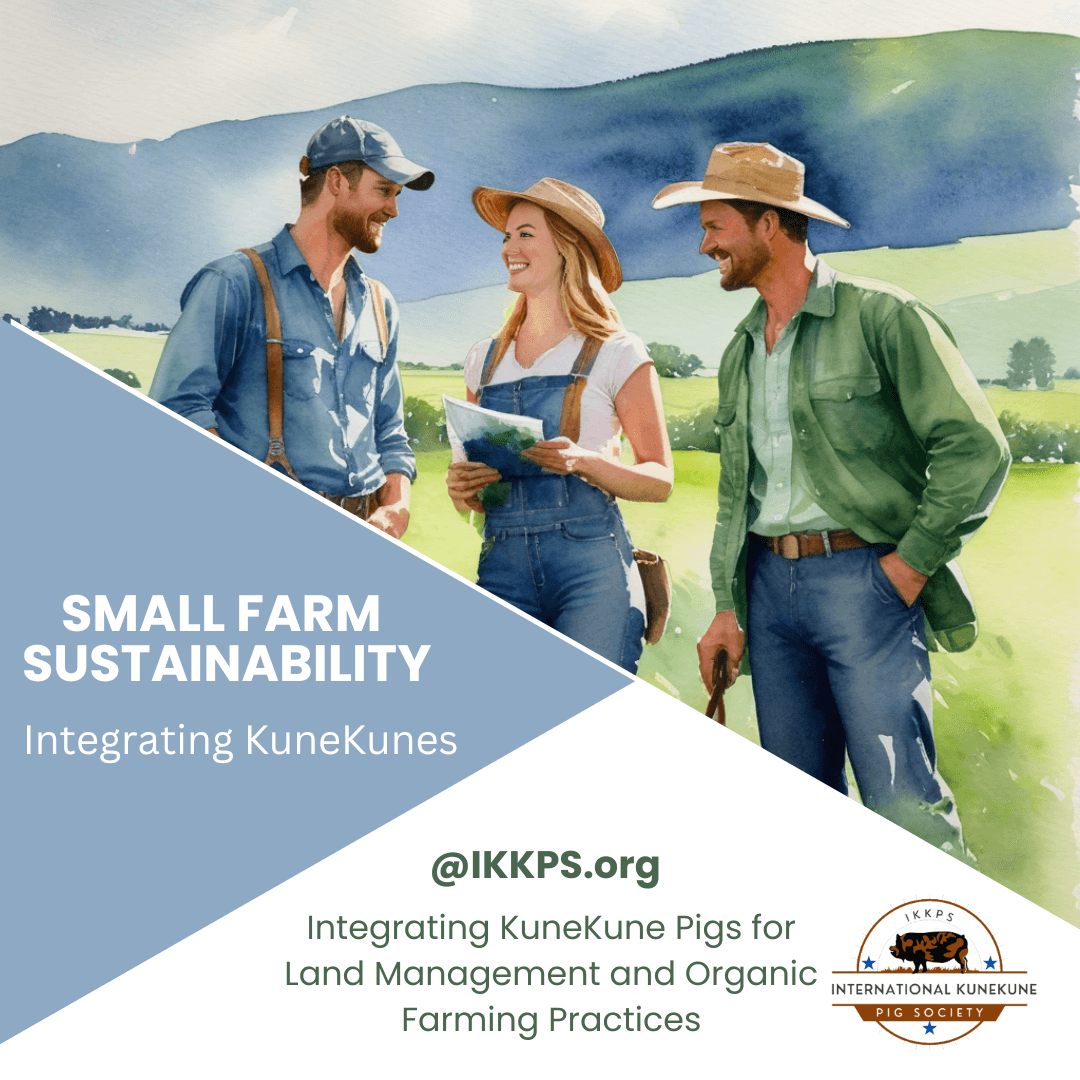
JOIN US
GET OUR KUNEKUNE
NEWSLETTER
New and highly discounted products, fresh and hot stories & useful information
Small Farm Sustainability: Integrating KuneKune Pigs for Land Management and Organic Farming Practices
Small-scale farmers face numerous challenges in maintaining sustainable agricultural practices while also managing their land effectively. One approach that has gained popularity in recent years is the integration of KuneKune pigs into small farm operations. These unique pigs offer a range of benefits for land management and organic farming practices, making them an ideal addition to sustainable farming systems. This article will explore how small-scale farmers can utilize KuneKune pigs to enhance their land management strategies and promote organic farming practices.
Click this if you would like this page read to you! We are using this new feature throughout the website and in our blog articles.
KuneKune pigs are a unique breed that has been gaining popularity among small-scale farmers for their ability to contribute to sustainable land management and organic farming practices. These pigs are known for their docile nature, grazing habits, and adaptability to various environments making them well-suited for small farm operations.
KuneKune pigs are grazing pigs that gently impact pastures and woodlands. They forage for plants without rooting the soil and disrupting mycelia systems, making them ideal for maintaining and improving pastures without causing excessive damage.
Environmental and Economic Benefits of integrating KuneKunes into small farm sustainability programs
Several case studies highlight the successful integration of KuneKunes into small farm operations. For example, a family-owned farm in Oregon has incorporated KuneKunes into its pasture-based system, where the pigs help manage weeds and improve soil health while providing a source of income through pork sales and selling their best for breeding stock. Despite facing challenges such as fencing and predator protection, the farmers have implemented strategies such as rotational grazing and electric fencing to overcome these obstacles and maximize the benefits of using KuneKunes on their farms.
Overall, the environmental and economic benefits of integrating KuneKunes into small farm sustainability are significant. By leveraging the natural behaviors of these pigs for weed control, soil health improvement, and waste reduction, farmers can create more resilient and productive farm systems. To successfully incorporate KuneKunes into their operations, farmers should consider factors such as breeding stock selection, fencing and housing requirements, predator protection, and marketing strategies. With proper planning and management, KuneKunes can be a valuable asset to small farms seeking to enhance their sustainability practices.

Benefits of Using KuneKune Pigs
We will discuss a few of the benefits of integrating your small farm with KuneKune pigs, just in case you are not familiar with all of them.
Size and Temperament:
KuneKune pigs are smaller than commercial pig breeds, making them more manageable for small-scale farming operations. They are known for their friendly and docile temperament, which makes them easy to handle and suitable for interaction with children.
Reduced Fence Challenges:
KuneKune pigs are less likely to challenge fences compared to other pig breeds. Their contented nature and less curious behavior contribute to their lower tendency to escape, reducing the need for extensive fencing measures.
Cold Tolerance:
Being a heritage breed, KuneKune pigs are more cold-tolerant than many other pig breeds. While they may require shelter during extreme weather conditions, they
generally do not need supplemental heat unless piglets are born in chilly weather. This cold tolerance makes them suitable for small farms in colder climates.
Minimal Health Needs and Care Requirements:
This breed has minimal health needs and care requirements compared to other pig breeds. They are generally hardy and resilient, requiring less intervention and veterinary care. This can be advantageous for small-scale farmers with limited resources or access to veterinary services.
Sustainable Meat Production:
KuneKune pigs are commonly bred for meat but grow more slowly than commercial pig breeds. This slower growth rate can benefit first-time farmers, allowing them to gain experience raising pigs for meat without the pressure of rapid production.
They produce rich, red marbled meat that is locked in a layer of fat to lock the flavor into the meat. Their meat is well worth the
wait and will give you such a sense of pride in feeding your family and friends.
Benefits to your small farm and land management
Now that you are more familiar with the benefits of the KuneKune pig breed, let's discuss how they can assist with land management and sustainable farming practices on your small farm.
Fertilizer Production:
KuneKune pigs are well-known for their skill in converting organic waste into nutrient-rich fertilizer. Their diet mainly consists of grass, forage, and kitchen scraps, including fruits and vegetables, which they efficiently turn into manure. Farmers can spread their fertilizing capabilities by strategically moving the pigs around different farm areas, naturally enriching the soil and reducing the need for synthetic fertilizers. You can even use their manure in your garden. Just be sure not to feed them molded fruits or vegetables.
Soil Aeration:
Rooting is a natural behavior for pigs and offers an unexpected benefit for small-scale farmers. While KuneKunes are not prone to rooting, they are pigs. As they root in the soil, KuneKune pigs help with soil aeration, breaking up compacted areas, and improving water infiltration. This process enhances the soil's overall health and increases the nutrient cycling. Creating a favorable environment for plant growth and reducing the risk of erosion. By incorporating KuneKunes into their operations, farmers can improve their soil's health and fertility, leading to higher crop yields and better farm productivity.
Composting:
KuneKune pigs are charming and friendly and play a valuable role in sustainable farming practices by integrating them into composting systems. Their natural rooting behavior enables them to break down organic material within the compost pile efficiently. The pigs' foraging and digging activities help aerate the compost, promoting decomposition and accelerating the breakdown process. As the KuneKune pigs interact with the compost, they contribute to mixing the materials, ensuring even decomposition and creating nutrient-rich organic matter. This process results in the production of high-quality compost, which can be used to enrich the soil in gardens or agricultural fields. It provides a natural and eco-friendly way to recycle organic waste.
Pest Control:
Insects, grubs, and other pests can significantly threaten crops. KuneKune pigs have an innate ability to seek out and consume these pests, reducing the need for chemical pesticides. Kunekunes love grubs. By allowing the pigs to roam freely in designated areas, farmers can manage pest populations naturally, resulting in healthier crops and a more sustainable farming system.
Weed Management:
Utilizing KuneKune pigs on small farms is key for weed control. These pigs are natural foragers with a strong preference for grazing on grass and weeds. This helps keep pastures clear and reduces the need for herbicides. By introducing the pigs into weed-infested areas, farmers can effectively manage weed growth while preserving the integrity of the land. This approach can significantly reduce costs associated with weed management and promote a more ecologically friendly approach to land maintenance.
Marginal Land Utilization:
KuneKune pigs can use marginal areas of the farm that may not be suitable for other livestock or crops. They do well foraging in wooded areas, along draws, and overgrown pastures, potentially improving these spaces for future plantings.
Rotational Grazing:
When incorporated into a rotational grazing system, KuneKunes fit nicely into a holistic approach to maintaining healthy, diverse pastures. Moving them strategically allows for even distribution of natural fertilizer and managed grazing.
When strategically rotated through pastures, KuneKune pigs maintain healthy, diverse pastures. Their grazing helps manage grass and forage growth, while their manure provides natural fertilization to support the pasture ecosystem.
Reducing Waste:
KuneKunes can help reduce waste on small farms by serving as natural waste recyclers. These pigs have a voracious appetite and can consume various food scraps, such as veggies and fruits, crop residues, and other organic materials that would otherwise go to waste. By feeding them some, farmers can reduce the amount of waste generated on their farms, decrease the need for external sources, and create a more closed-loop system that promotes sustainability.
It's important to note that KuneKunes are not only efficient waste recyclers but also require minimal amounts of grain to sustain themselves. Utilizing your waste items can further reduce the amount of grain needed. This not only promotes sustainability but also has the potential to save you money on feed costs. When we refer to waste, we mean items like stale bread, fruits not quite spoiled yet, and all veggies no longer fresh for humans.
Also, using them to clean up gardens and orchards is a job they will love to help you with. When you have fruit trees, fruit always falls, attracting insects, which can be easily avoided with KuneKune pigs in that pasture.
Conclusion:
Integrating KuneKune pigs into small-scale farming can provide numerous benefits for land management and organic farming practices. Their natural abilities in producing fertilizer, aerating the soil, controlling pests, and managing weeds make them valuable additions to sustainable farming systems. By utilizing the unique traits of KuneKune pigs, small-scale farmers can improve their land’s productivity, decrease reliance on commercial feeds and pesticides, and promote organic and environmentally friendly farming practices. Embracing the potential of KuneKune pigs can contribute to small farms' long-term sustainability and success.
It's important to note that while KuneKune pigs are generally considered suitable for first-time farmers, it's still essential to research and consult with experienced breeders or farmers to understand the specific needs and characteristics of KuneKune pigs before integrating them into a farming system.
Registry Office
17500 Hamilton Arms Court Dewitt, VA 23840